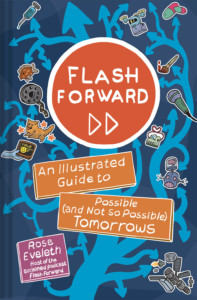Everything is bad. There was a Biblical-style swarm of locusts in East Africa last year. The pandemic is still going. Big Tech could be tracking our faces at every moment. Every day seems to bring a new headline about how the future is careening toward us, coming faster than it ever has.
For many, the pace of change can create a sense of helplessness, the feeling that we are passive observers being taken on a ride. Flash Forward, the podcast that journalist Rose Eveleth has produced for the past six years, tries to offer something else: complexity, creativity, and maybe even a respite from that sense of paralyzed horror.
It’s “a powerful way to help people contextualize the future and feel a little more prepared and feel a little less freaked out,” Eveleth says.
Flash Forward has done episodes on head transplants, a world where we can read each other’s minds, drug pirates, and more. Each episode begins with an audio fiction piece and then goes into in-depth interviews with experts, making Eveleth one of the people at the forefront of the genre known as “speculative journalism.”
As a format, speculative journalism has become popular because it’s a powerful way to help people envision the future, combining narrative with real-life expertise and detail, all without being tied to the ephemeral news cycle. But sometimes, Eveleth says, speculative journalism can take on the tone of prediction instead of speculation, of telling us the future instead of presenting a possibility. Her goal, then, is to “break through and remind people that the future has not happened yet, which is obvious but sometimes stands to be said.” By now, nearly everyone knows that Amazon has poor labor conditions—but what would a future dominated by Amazon really, specifically, look like and how might we get there and how could we prevent that?
The listener, individually, may not be successful if they take on Amazon—or, say, climate change—but it’s worth thinking about the decisions one can make and where one can resist. Fiction can help people connect. It’s “a powerful way to help people contextualize the future and feel a little more prepared and feel a little less freaked out,” Eveleth says. And before you ask: Yes, she has gotten things wrong. In early 2016, Eveleth created an episode speculating whether youthful bad opinions on the internet might disqualify today’s kids from being elected to office. Months later, sexual assault allegations and much more did not prevent Donald Trump from winning the presidency. So it’s good that Flash Forward is not about forecasting. It’s about exploring.
There are so many ways to contextualize and explain and explore. Eveleth recently turned Flash Forward into her own podcast and membership network—Flash Forward Presents—to host other projects, which include new podcasts, audio dramas, and her illustrated Flash Forward anthology (out today from Abrams). There’s a lot of emerging technology and a lot of future to discuss and “the Rose Eveleth project,” as she jokingly calls herself, is broader than one product.
Not a public radio person
One common strand of the podcast genesis story involves a lifelong love of public radio—growing up listening to WNYC and NPR and so on. Eveleth’s family listened to Rush Limbaugh; the joys of radio were not on her radar at all. In 2010, when she decided to go to New York University for a masters in science journalism, the goal was to become a John McPhee-style longform features writer.

At NYU, however, a friend asked her to co-produce a weekly student radio show, which nobody listened to because it was on really late at night. (That was fine, Eveleth says, because it was not a very good show). It soon became clear that the audio form could offer more freedom than print or online publications, especially for someone starting out. News stories could be formulaic; magazines wouldn’t allow a new-ish writer to do a big feature. But in audio, she could do whatever she wanted. Her lack of background in the medium, and the fact that she didn’t know the rules, became advantages that helped her become more creative. Plus, sound simply offered new opportunities. Once, Eveleth did an audio story about what makes a good protest song, and hearing a huge crowd chant “SI SE PUEDE” is simply more satisfying than seeing it written out.
All this led her to work on NYU’s science podcast Scienceline and intern at Radiolab and continue working on audio stories alongside publishing articles as a freelancer. In 2015, Annalee Newitz, then editor-in-chief at Gizmodo, approached Eveleth to do a podcast about the future. Called Meanwhile in the Future, the podcast consisted of 20-minute sound-bite episodes, far less complex than the hour-long episodes Eveleth puts out now. She hadn’t yet come up with the cohesive strategy that now informs Flash Forward. That took trial and error. “It’s easy to retcon your career to make it seem like it’s totally fluid and it’s a nice lovely arc—but in the moment you’re like, ‘I don’t know, I’m trying to make stuff work and follow my own interests,’” she says. Soon, though, Newitz left Gizmodo, and the Hulk Hogan lawsuit left the future of Gawker an open question and it became clear that Meanwhile in the Future would not be renewed. So Eveleth renamed the podcast and decided to strike out on her own.
Getting eyeballs
Anyone who works without institutional backing or a marketing team or a sales rep really needs to figure out how to build an audience. Audience development often happens in two buckets, Eveleth says. One bucket consists of the people who already listen to podcasts and know how to download podcasts. The other bucket consists of…the people who don’t. These can be very different segments.
The most successful tactic hasn’t been cross-promos but actually producing a story for another podcast.
To reach the first group—people who listen to podcasts but not necessarily her podcast—the usual technique is cross-promos. Eveleth has done that. She’s been a guest on other podcasts, like Alie Ward’s Ologies, and has had other podcast hosts on her show in return.
Yet the most successful tactic hasn’t been cross-promos but actually producing a story for another podcast. Eveleth created an episode of 99 Percent Invisible about chili peppers. She did a collaboration with Planet Money. She made an episode of Call Your Girlfriend and “that did way more than anytime I had cross-promo with Call Your Girlfriend.” It’s far more work than saying “if you like them, you’ll like me too,” but it cuts out the middleman. It shows the audience directly what you’re capable of and gives them a sense of you as a person. It requires less trust because the evidence is right there. They’re less likely to forget about you and your shout-out by the end of the episode.
Now, there’s those who don’t listen to podcasts at all, and this is a different beast. Eveleth’s solution is to try to reach the audience where they are. She writes and pitches related articles—like this one about the future of music—to get her name out there. She created a choose-your-own-adventure show for Pop-Up Magazine. She’s been active on Twitter, where a lot of people who follow her don’t necessarily listen to Flash Forward. This last technique does come with quite a bit of ambivalence. “As a journalist, I have a little bit of a weird feeling around people coming to the show because of me personally as opposed to the show,” she says. “I kind of want to hide behind the show a lot more than I think other hosts do. I struggle a little bit with that, figuring out where that starts and stops and how to market myself. But if someone doesn’t listen to podcasts, the way they’re going to find the show is by connecting with me personally.”
Future projects
Eveleth has endless ideas, as shown by the Flash Forward book that comes out today. People had said for years that she should write a book, but it never made sense—what was she going to do, transcribe the episodes? (She already posts episode transcripts, by the way.) But once illustrator Sophie Goldstein suggested a comics anthology, everything began to fit together. Eveleth sent 12 futures—luckily, the “pandemic future” was not one of the selections—to 12 artists who interpreted and illustrated the storylines. Eveleth wrote an essay for every scenario and there are two new, never-featured-on-the-podcast futures. She’s also in early talks for a television adaptation of the podcast.

Most recently, Eveleth launched the Flash Forward Presents network, which hosts a second podcast called Advice for/from the Future and collects what might otherwise be one-off projects. The network helps people feel like they’re investing in something bigger and more exciting, in an entire world of ideas that come from Rose Eveleth’s brain. It’s also useful for gaining ad support. Advice for/from the Future, for example, is fairly new, but because it’s part of a network that is anchored by the success of Flash Forward, advertisers are more likely to trust and invest in the offering.
Such is the type of business savvy that Eveleth brings to the other side of her work. Though it’s tempting to split her job into the interesting and creative editorial work and then the slog of selling ads, she tries to avoid the separation and instead think creatively about how to make money. Her ads, for instance, are some of the best on any podcast.
Many advertisers expect personal endorsements for products, but Eveleth decided at the outset that she wouldn’t do these. Because of that, the ads needed to be just as good, or even better, than an endorsement, and so she does a lot of her own research to make ads as fun as possible. One of her advertisers was a globemaker, so she did an ad about the history of globes and the math behind globes and the behind-the-scenes of the globe scene in Charlie Chaplin’s The Great Dictator. Thinking about business as another avenue for creativity has helped her avoid becoming burned out by the practical realities of finding funding. Listeners praise her and say that these are the only ads they don’t forward through. Of course, advertisers like it too.
The hope is that this will sustain Flash Forward, and Advice for/from the Future, and any number of other projects in the years to come. Certainly, the future itself is not going to slow down. “It’s definitely hard sometimes, where I’m like ‘the world is literally ending and I make a weird show about the future, shouldn’t I be getting my EMT training?’” Eveleth says. Shouldn’t we all be training in more practical ways? Or at least going to law school? But seeing the importance of philosophical exploration of the future helps with those doubts—otherwise, Eveleth would have stopped making Flash Forward a long time ago. “I sort of fell into it,” she says, but she still feels like there’s so much left to discover.




Comments